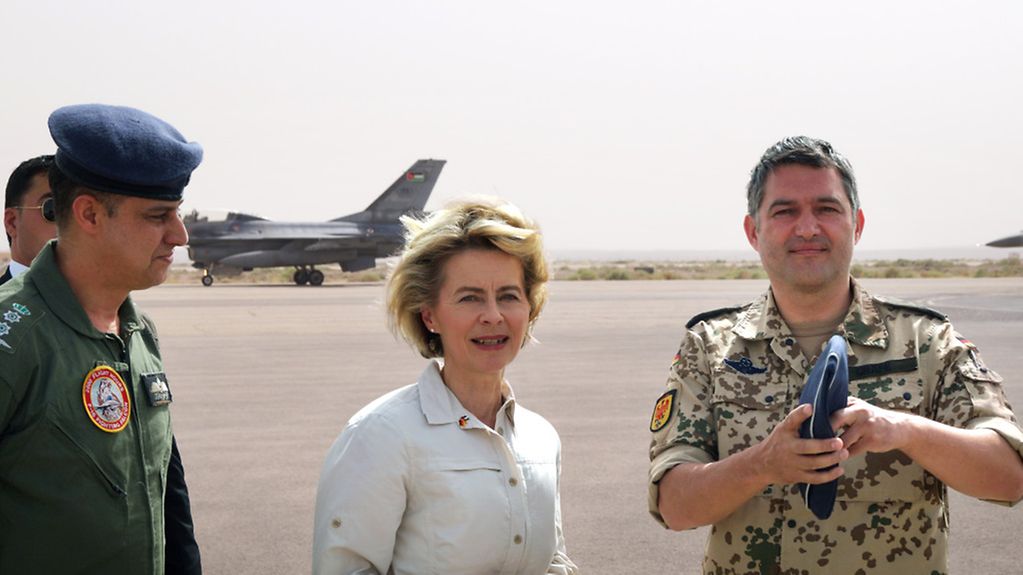Bundeswehr in Turkey
The German government still hopes to gain the right for members of the German Bundestag to visit German troops stationed at Incirlik Air Base through political channels. Parallel to these efforts, Ursula von der Leyen has assessed an alternative base during a visit to Jordan.
3 min reading time

In Jordan Ursula von der Leyen found out more about the facilities offered by Al Azraq Air Base
Photo: Bundeswehr
It must be possible for members of the German Bundestag to visit German troops both in Incirlik and at the NATO base in Konya. On this point the entire German government is in full agreement, reported federal government spokesperson Steffen Seibert at the government press conference. All sides are, of course, aware of the differences between Incirlik and the NATO base in Konya, he added.
The ban on visits of members of the German Bundestag currently affects only Incirlik Air Base, said the government spokesperson. "We are endeavouring at various levels to move the Turkish government to modify its stance on this point".
By contrast, any withdrawal of German troops from Konya would have to be discussed with NATO partners. On the sidelines of this week’s NATO meeting, there will perhaps be an opportunity to broach the issue.
Federal Minister of Defence visits Jordan
On 19 May Federal Minister of Defence Ursula von der Leyen flew to Jordan. She met a Bundeswehr assessment team, which is exploring in Jordan alternative bases for the Bundeswehr contingent currently stationed in Incirlik.
"My initial impression of the Al Azraq Air Base here in Jordan is positive," said Ursula von der Leyen after her meeting with the team. The minister visited an airfield in Jordan. The operational facilities available for operating tanker aircraft and Tornados are good, she said. "But political talks with Turkey are continuing at various levels," stressed Jens Flosdorff, spokesperson of the Federal Ministry of Defence at the government press conference on Monday.
German NATO troops in Konya
The discussion revolving around the stationing of more German troops in Turkey has spread to include the NATO base in Konya. On Friday (19 May) federal government spokesperson Steffen Seibert pointed to the special conditions surrounding the troop deployment in Konya. "Unlike the air base in Incirlik, Konya is also a NATO base. NATO reconnaissance planes operate here with two important duties," he explained. "They support the anti-IS coalition, but they also – and this is important – play an important part in monitoring NATO airspace."
NATO AWACS (Airborne Early Warning and Control System) aircraft are thus a joint NATO capability and not a national capability. "And that means that even if German troops are involved, only NATO as a whole can decide on the deployment of NATO AWACS planes. Within NATO a withdrawal from Konya is not on the agenda," explained the government spokesperson.
It is important to explore alternative locations for the contingent currently stationed in Incirlik, so that detailed options can be decided, should it prove impossible to reach an agreement with the Turkish side. It is only logical, given the current debate, to visit and explore alternatives, said Steffen Seibert last Wednesday (17 May), and added, “The Chancellor fully supports this approach."
Fighting IS together
From Incirlik Air Base German planes fly missions over Syrian and Iraqi sovereign territory as part of the anti-IS coalition. Following the attacks in Paris in November 2015, France requested support in the fight against the "IS". Germany is supporting the international alliance with Tornado reconnaissance aircraft and tanker aircraft for the mid-air refuelling of fighter jets.
On 4 December 2015 the German Bundestag voted for the deployment of armed forces to prevent the terrorist activities of the so-called "IS".